Contents
| |||||
| Decades: | |||||
|---|---|---|---|---|---|
| See also: | Other events of 1899 History of China • Timeline • Years | ||||
Events from the year 1899 in China.
| |||||
| Decades: | |||||
|---|---|---|---|---|---|
| See also: | Other events of 1899 History of China • Timeline • Years | ||||
Events from the year 1899 in China.

Yuan Shikai was a Chinese general and statesman who served as Prime Minister of the Imperial Cabinet, the second provisional president of the Republic of China, head of the Beiyang government from 1912 to 1916 and Emperor of China from 1915 to 1916. A major political figure during the late Qing dynasty, he spearheaded a number of major modernisation programs and reforms and played a decisive role in securing the abdication of the Xuantong Emperor in 1912, which marked the collapse of the Qing monarchy and the end of imperial rule in China.
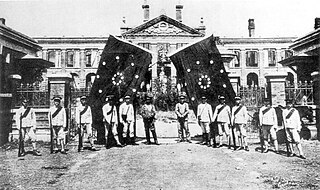
The Wuchang Uprising was an armed rebellion against the ruling Qing dynasty that took place in Wuchang in the Chinese province of Hubei on 10 October 1911, beginning the Xinhai Revolution that successfully overthrew China's last imperial dynasty. It was led by elements of the New Army, influenced by revolutionary ideas from Tongmenghui. The uprising and the eventual revolution directly led to the downfall of the Qing dynasty with almost three centuries of imperial rule, and the establishment of the Republic of China (ROC), which commemorates the anniversary of the uprising's outbreak on 10 October as the National Day of the Republic of China.

Hsinchu is a city located in northwestern Taiwan. It is the most populous city in Taiwan that is not a special municipality, with estimated 450,655 inhabitants. Hsinchu is a coastal city bordering the Taiwan Strait to the west, Hsinchu County to the north and east, and Miaoli County to the south. Hsinchu is nicknamed the Windy City for its strong northeastern monsoon during the autumn and winter seasons.

The General Secretary of the Central Committee of the Chinese Communist Party is the leader of the Chinese Communist Party (CCP), the sole ruling party of the People's Republic of China (PRC). Since 1989, the CCP general secretary has been the paramount leader of the PRC.
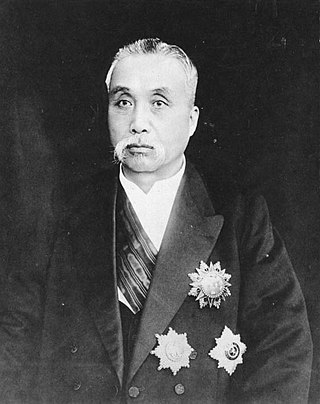
Xu Shichang was a Chinese politician who served as the President of the Republic of China, in Beijing, from 10 October 1918 to 2 June 1922. The only permanent president of the Beiyang government to be a civilian, his presidency was also the longest of the Warlord Era. Previously, he was Minister of the Cabinet of the Imperial Cabinet during the Qing Dynasty.
Paramount leader is an informal term for the most important political figure in the People's Republic of China (PRC). The paramount leader typically controls the Chinese Communist Party (CCP) and the People's Liberation Army (PLA), often holding the titles of CCP General Secretary and Chairman of the Central Military Commission (CMC). The state representative, head of state (president) or head of government (premier) are not necessarily paramount leader—under China's party-state system, CCP roles are politically more important than state titles.
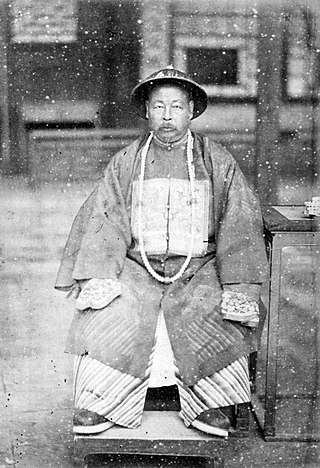
Zuo Zongtang, sometimes referred to as General Tso, was a statesman and military leader of the late Qing dynasty.

The Beiyang Army, named after the Beiyang region, was a combined large army, Western-style Imperial Chinese Army established by the Qing dynasty government in the late 19th century. It was the centerpiece of a general reconstruction of Qing China's military system. The Beiyang Army played a major role in Chinese politics for at least three decades and arguably right up to 1949. It made the Xinhai Revolution of 1911 possible, and, by dividing into warlord factions known as the Beiyang Clique, ushered in a period of regional division.
Events in the year 1936 in India.
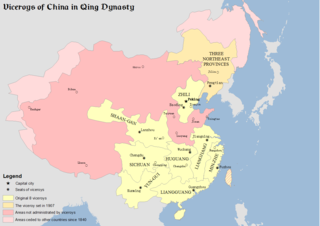
Zongdu were high-level officials responsible for overseeing the governors of several provinces in Ming and Qing China. One viceroy usually administered several provinces and was in charge of all affairs of military, food, wages, rivers, and provincial governors within their region of jurisdiction. Viceroys were appointed by and directly reported to the Emperor.
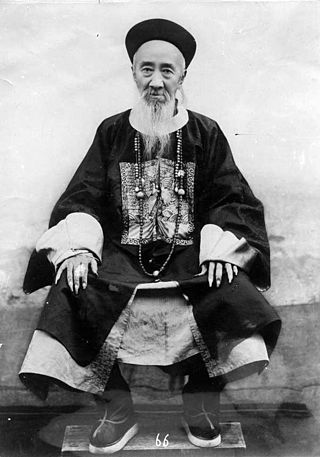
Zhang Zhidong was a Chinese politician who lived during the late Qing dynasty. Along with Zeng Guofan, Li Hongzhang and Zuo Zongtang, Zhang Zhidong was one of the four most famous officials of the late Qing dynasty. Known for advocating controlled reform and modernization of Chinese troops, he served as the governor of Shanxi Province and viceroy of Huguang, Liangguang and Liangjiang, and also as a member of the Grand Council. He took a leading role in the abolition of the Imperial examination system in 1905. The Red Guards destroyed his tomb in 1966 during the Cultural Revolution. His remains were rediscovered in 2007 and reburied.

The government of the People's Republic of China is based on a system of people's congress within the parameters of a unitary communist state, in which the ruling Chinese Communist Party (CCP) enacts its policies through people's congresses. This system is based on the principle of unified state power, in which the legislature, the National People's Congress (NPC), is constitutionally enshrined as "the highest state organ of power." As China's political system has no separation of powers, there is only one branch of government which is represented by the legislature. The CCP through the NPC enacts unified leadership, which requires that all state organs, from the Supreme People's Court to the President of China, are elected by, answerable to, and have no separate powers than those granted to them by the NPC. By law, all elections at all levels must adhere to the leadership of the CCP. The CCP controls appointments in all state bodies through a two-thirds majority in the NPC. The remaining seats are held by nominally independent delegates and eight minor political parties, which are non-oppositional and support the CCP. All government bodies and state-owned enterprises have internal CCP committees that lead the decision-making in these institutions.

Frederick Temple Hamilton-Temple-Blackwood, 3rd Marquess of Dufferin and Ava,, styled Lord Frederick Blackwood between 1888 and 1918, was a British soldier and politician. He died in an aircraft crash in 1930 at the age of 55.

Cen Chunxuan, courtesy name Yunjie, was a Zhuang Chinese politician who lived in the late Qing dynasty and Republic of China.
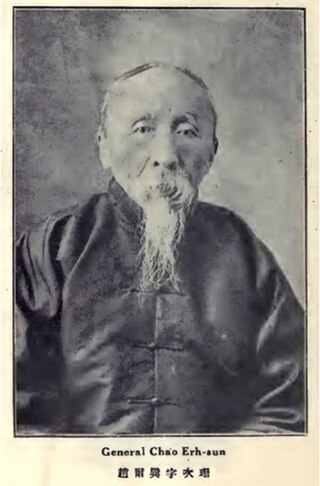
Zhao Erxun, courtesy name Cishan, art name Wubu, was a Chinese political and military officeholder who lived in the late Qing dynasty. He served in numerous high-ranking positions under the Qing government, including Viceroy of Sichuan, Viceroy of Huguang, and Viceroy of the Three Northeast Provinces. After the fall of the Qing dynasty, he became a historian and was the lead editor of the Draft History of Qing.
The following lists events that happened during 1911 in China.

The president of China, officially titled the president of the People's Republic of China, is the state representative of the People's Republic of China, which on its own is a ceremonial office and has no real power in China's political system. While the office has many of the characteristics of a head of state, the Chinese constitution does not define it as such. However, since 1993, the post has been held by the general secretary of the Chinese Communist Party (CCP) and chairman of the Central Military Commission, who is China's de facto leader.
The following lists events that happened during 1903 in China.
Events from the year 1849 in China.
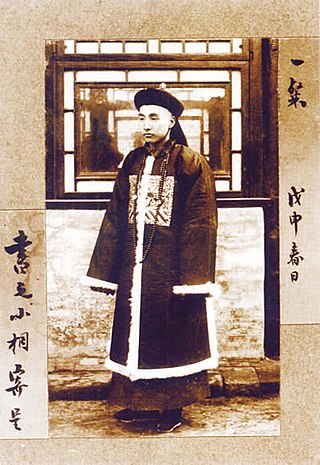
The Qing dynasty (1644–1912) was the last imperial dynasty of China. The early Qing emperors adopted the bureaucratic structures and institutions from the preceding Ming dynasty but split rule between the Han and Manchus with some positions also given to Mongols. Like previous dynasties, the Qing recruited officials via the imperial examination system until the system was abolished in 1905. The Qing divided the positions into civil and military positions, each having nine grades or ranks, each subdivided into a and b categories. Civil appointments ranged from an attendant to the emperor or a grand secretary in the Forbidden City (highest) to being a prefectural tax collector, deputy jail warden, deputy police commissioner, or tax examiner. Military appointments ranged from being a field marshal or chamberlain of the imperial bodyguard to a third class sergeant, corporal or a first or second class private.